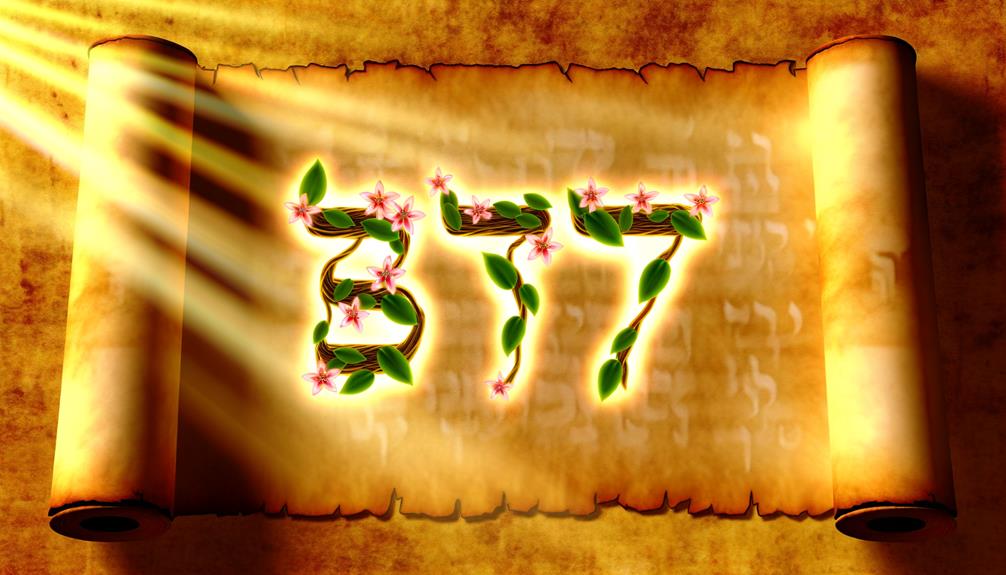Hebrew Meaning of Love in the Bible: Covenant and Devotion
When I explore the Hebrew meaning of love in the Bible, I find it encompasses multifaceted dimensions like ahavah, chesed, dod, raya, and racham. Ahavah represents deep affection and covenantal loyalty, while chesed embodies steadfast loving-kindness and divine faithfulness.
Dod captures the intimacy of romantic love, often celebrated in the Song of Solomon. Raya illustrates profound friendship with a sacrificial loyalty, seen in the bond between David and Jonathan.
Racham, rooted in compassionate empathy, reflects God’s tender mercy. Each term enriches our understanding of biblical love, encouraging us to seek deeper insights into these divine expressions.

Hebrew Meaning of Love in the Bible: Ahavah, Chesed, and Racham
| Hebrew Word | Meaning | Explanation |
|---|---|---|
| Ahavah (אַהֲבָה) | General love; deep affection and commitment | “Ahavah” is the most common Hebrew word for love in the Bible, signifying not just emotional affection, but a deep sense of commitment, loyalty, and care. It is used to describe both human love (between individuals) and divine love (God’s love for humanity). |
| Chesed (חֶסֶד) | Covenant love; steadfast, loyal love | “Chesed” refers to God’s steadfast, faithful love, often described as covenantal love. It implies mercy, kindness, loyalty, and the unbreakable love God shows toward His people. This word is closely associated with God’s enduring faithfulness in keeping His promises. |
| Racham (רַחַם) | Compassionate love; mercy, tender affection | “Racham” is often used to describe God’s tender, compassionate love, similar to a parent’s love for their child. It conveys mercy and nurturing care, highlighting God’s deep, empathetic love for humanity. |
| Dod (דּוֹד) | Romantic or passionate love | “Dod” is the word used for romantic or passionate love, as seen in Song of Solomon. It conveys a physical and intimate aspect of love, often used in the context of a romantic relationship. |
| Yedid (יְדִיד) | Beloved; intimate, dear love | “Yedid” refers to a more intimate and personal form of love, often used to describe someone who is dearly loved or beloved. It highlights a close, affectionate bond between individuals or between God and His people. |
Ahavah: Deep Affection

In exploring the Hebrew word ‘ahavah,’ we uncover a profound sense of deep affection that permeates the biblical narrative, revealing love’s multifaceted nature within the scriptures.
‘Ahavah’ transcends mere emotion, embodying commitment, loyalty, and covenantal bonds. When I think of Deuteronomy 6:5, ‘Love the Lord your God with all your heart,’ I see ‘ahavah’ as an all-encompassing, active devotion.
This love isn’t passive; it’s a call to action, urging us to serve others compassionately. Historically, ‘ahavah’ reflects God’s unwavering love for Israel, a love that’s sacrificial and enduring.
In our lives, embodying ‘ahavah’ means fostering genuine relationships, rooted in selfless service, reinforcing our faith through tangible acts of kindness and unwavering commitment to one another.
Chesed: Loving-Kindness

Often characterized by its boundless generosity and steadfast loyalty, ‘chesed’ represents a divine loving-kindness that permeates the covenantal relationship between God and His people. This Hebrew term embodies a commitment that transcends mere obligation, reflecting God’s unwavering grace. In Scripture, ‘chesed’ is a recurring theme, emphasizing the depth of God’s love.
- Ruth’s Devotion: Ruth’s loyalty to Naomi is a profound human example of ‘chesed’.
- God’s Covenant: His eternal promise to Israel showcases His unyielding faithfulness.
These examples illustrate that ‘chesed’ isn’t just an emotion but an actionable, enduring commitment. Embracing ‘chesed’ inspires us to serve others with enduring love and compassion.
Dod: Romantic Love

While ‘chesed‘ emphasizes divine loving-kindness, ‘dod‘ captures the passionate and intimate aspects of romantic love celebrated in the Song of Solomon.
This book of the Bible, also known as the Song of Songs, vividly portrays the fervent emotions between lovers. I see ‘dod’ as an expression of God’s gift of romantic love, designed to reflect divine beauty and intimacy.
Historically, ‘dod’ has been interpreted as a metaphor for God’s relationship with Israel, symbolizing deep, covenantal love.
Scripturally, phrases like ‘Let him kiss me with the kisses of his mouth’ (Song of Solomon 1:2) highlight the physical and emotional dimensions of ‘dod’.
Understanding ‘dod’ enriches our appreciation for the sacredness of marital love and its role in mirroring divine affection.
Raya: Friendship Love

Throughout the Bible, ‘raya’ epitomizes the profound bond of friendship, illustrating how deep companionship and mutual affection reflect God’s design for human relationships. This Hebrew word surfaces in the Song of Solomon, portraying an intimate friendship that underpins romantic love.
Beyond romance, ‘raya’ signifies the selfless loyalty seen in friendships like David and Jonathan’s.
- Sacrificial loyalty: Jonathan risked his life for David, modeling ultimate friendship.
- Emotional support: David and Jonathan’s bond provided strength in trials.
Understanding ‘raya’ helps us foster deeper, God-centered friendships. These relationships, rooted in biblical principles, empower us to serve others with Christ-like love and unwavering devotion.
Racham: Compassionate Love

Racham, a Hebrew term for compassionate love, vividly illustrates God’s tender mercy and deep empathy for humanity, as depicted in passages like Isaiah 49:15 where God compares His unwavering compassion to a mother’s love for her child.
This word, rooted in ‘rechem,’ meaning womb, evokes profound intimacy and nurturing care.
Historically, racham embodies the covenantal relationship God maintains with His people, reflecting a love that’s both protective and nurturing.
Scripturally, racham manifests in God’s actions, from delivering Israel from Egypt to forgiving their transgressions time and again.
For those of us committed to serving others, racham challenges us to embody this same depth of compassion, offering mercy and understanding to those we encounter in our daily lives.
Conclusion
In exploring the Hebrew meanings of love in the Bible—Ahavah, Chesed, Dod, Raya, and Racham—I’ve discovered a profound tapestry of divine intention.
Each term enriches our understanding of God’s multifaceted love.
Whether through deep affection, loving-kindness, romantic passion, friendship, or compassionate care, Scripture reveals that love is both complex and sacred. The biblical definition of love encompasses a wide range of emotions and actions, calling us to love our neighbors as ourselves, to love our enemies, and to love God with all our heart, soul, and mind. This multifaceted nature of love mirrors the depth and richness of our relationships with others and with God, and it serves as a guiding principle for how we are called to live and interact with one another. In essence, the biblical definition of love challenges us to extend grace, kindness, and selflessness to those around us, reflecting the ultimate example of love shown to us through the sacrificial love of Jesus Christ.
Could it be that these ancient words are keys to revealing a deeper, more authentic relationship with the Divine?
It’s a theory worth pondering.






